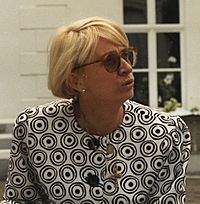Françoise Mallet-Joris facts for kids
Quick facts for kids
Françoise Mallet-Joris
|
|
|---|---|

Françoise Mallet-Joris in 1988
|
|
| Born |
Françoise-Eugenie-Julienne Lilar
6 July 1930 Antwerp, Belgium
|
| Died | 13 August 2016 (aged 86) Bry-sur-Marne, France
|
| Nationality | Belgian |
| Occupation | Author |
| Organization | Prix Femina Académie Goncourt |
| Spouse(s) |
|
| Children | 4 |
Françoise Mallet-Joris (born July 6, 1930 – died August 13, 2016) was a famous Belgian writer. Her real name was Françoise Lilar. She was a member of important literary groups in France, like the Prix Femina committee and the Académie Goncourt.
Contents
Early Life and Family
Françoise-Eugenie-Julienne Lilar was born on July 6, 1930, in Antwerp, Belgium. She was the first child of a very talented family. Her mother, Suzanne Lilar, was a writer and the first woman allowed to practice law in Antwerp. Her father, Albert Lilar, was a Belgian Minister of Justice.
Françoise also had a younger sister named Marie Fredericq-Lilar, who became an art historian. Even though her family spoke French at home, Françoise learned Flemish from their maid.
Teenage Years and Independence
As a teenager, Françoise was quite rebellious. She really wanted to be independent from her parents. To show her defiance, she started dating an older playwright named Louis Decreux.
When her parents found out, they sent her to Bryn Mawr College in Pennsylvania, USA. But she didn't stay there for long. To further upset her parents, she married Robert Amadou, a student from Yale, in 1948. That same year, their son Daniel was born. Robert Amadou was French, and through him, Françoise became a French citizen. After getting her French citizenship, she and Robert divorced.
Later, while living in Paris, Françoise attended the Sorbonne. Around this time, she and her parents became friends again.
Writing Career
Françoise Lilar started her writing career in 1951 with her first novel, Le rempart des Béguines. She used the pen name Françoise Mallet at first. Later, she changed it to Françoise Mallet-Joris so people wouldn't confuse her with another writer named Robert Mallet.
Her first book was translated into English as The Illusionist. It was also called Into the Labyrinth and The Loving and the Daring. The story takes place in a town that sounds a lot like her hometown of Antwerp. It talks about different social classes.
In 1955, she wrote a sequel called La chambre rouge (The Red Room). In this book, she continued to explore themes of social class and social rules in Belgium.
Becoming a Public Figure
As her career grew, Françoise Mallet-Joris became a very well-known writer in France. She focused more on her life and work in Paris rather than her Belgian background. Her last novel, Ni vous sans moi, ni moi sans vous, was published in 2007.
Main Themes in Her Books
Mallet-Joris' novels often explore how people interact with each other and the idea of social class in France and Belgium. Her characters often face disappointment when their hopes don't match reality. She also wrote about characters who try to climb the social ladder or who are dishonest.
In her 1976 novel Allegra, she wrote about racism and feminism in France.
She also wrote non-fiction books. One example is The Uncompromising Heart: A Life of Marie Mancini, Louis XIV's First Love from 1964. She also wrote essays about her thoughts on life and writing in books like Lettre à moi-même (A Letter to Myself) in 1963 and La Maison de papier (The Paper House) in 1970.
Literary Awards and Recognition
Françoise Mallet-Joris won several important awards for her writing:
- The "Librarians' Prize" (Prix des bibliothécaires) in 1958 for House of Lies (original French title: Les mensonges).
- The Femina Prize in 1958 for Café Céleste (original French title: L'empire céleste).
- The Monaco Prize in 1964 for her biography of Marie Mancini.
Personal Life and Later Years
In 1952, Françoise married French historian Alain Joxe, but their marriage lasted only two years. She described it as a "summer romance."
Later, she started a relationship with Jacques Delfau. They married in 1958 and had three children together: Vincent, Alberte, and Pauline.
From 1969 to 1971, Françoise was part of the Prix Femina jury, which chooses a famous French literary prize winner. After her time on that jury ended, she was chosen to join the Goncourt Academy in November 1971. This is a very respected group of writers in France. She stayed a member until 2011, when she resigned because of her health.
Françoise Mallet-Joris passed away on August 13, 2016, in Bry-sur-Marne, France. She was 86 years old.
Selected Works
- 1951: Le rempart des Béguines (translated as The Illusionist)
- 1955: La chambre rouge (The Red Room)
- 1958: Cordélia (a collection of short stories)
- 1966: Les signes et les prodiges (Signs and Wonders)
- 1968: Trois âges de la nuit (The Witches)
- 1970: La Maison de papier (The Paper House)
- 1973: Le jeu du souterrain (The Underground Game)
- 1976: Allegra
- 1978: Jeanne Guyon (a biography)
- 1980: Dickie-Roi
- 1985: Le rire de Laura (Laura's Laugh)
- 1990: Adriana Sposa
- 1993: Divine
- 1993: Les Larmes
See also
 In Spanish: Françoise Mallet-Joris para niños
In Spanish: Françoise Mallet-Joris para niños
 | Precious Adams |
 | Lauren Anderson |
 | Janet Collins |

